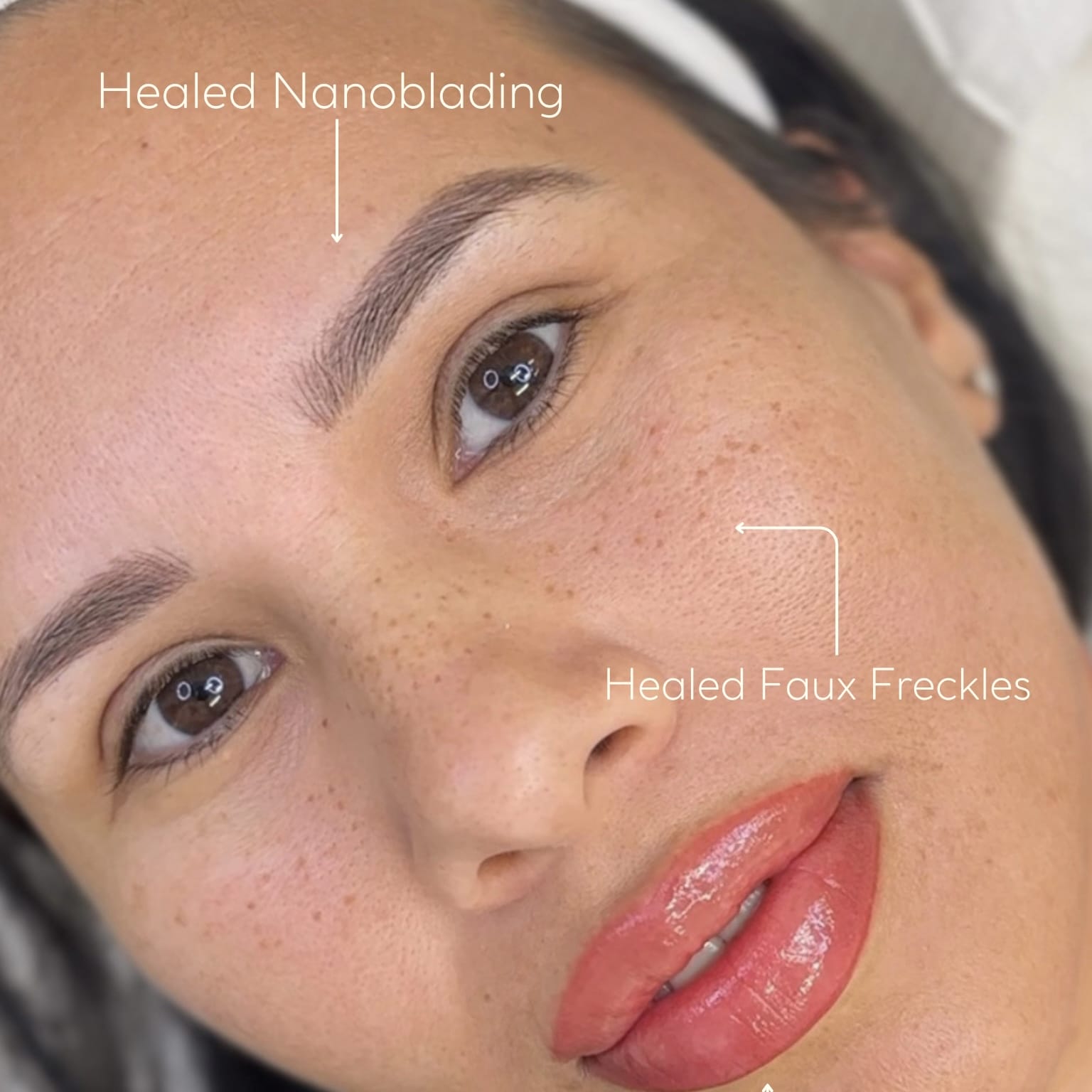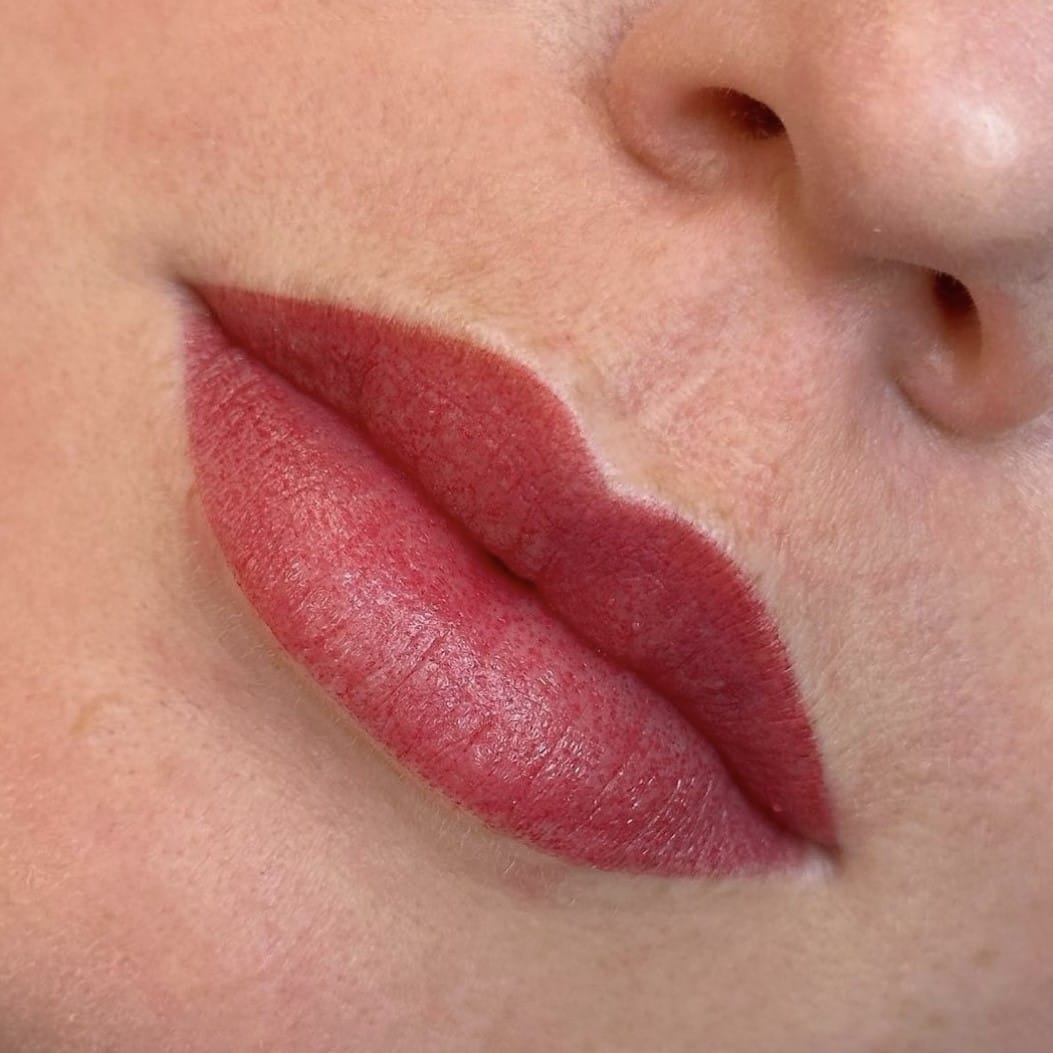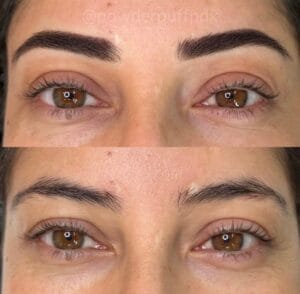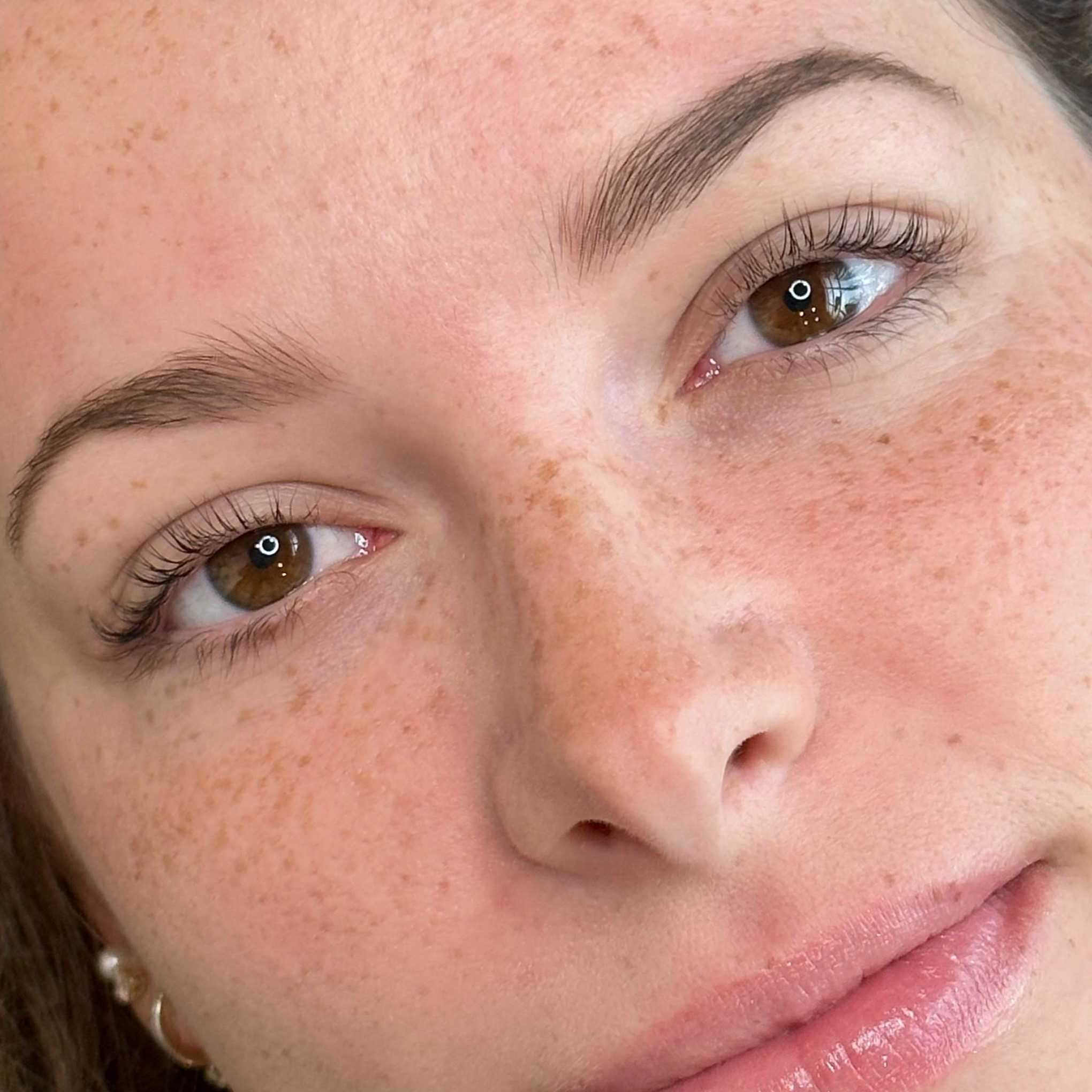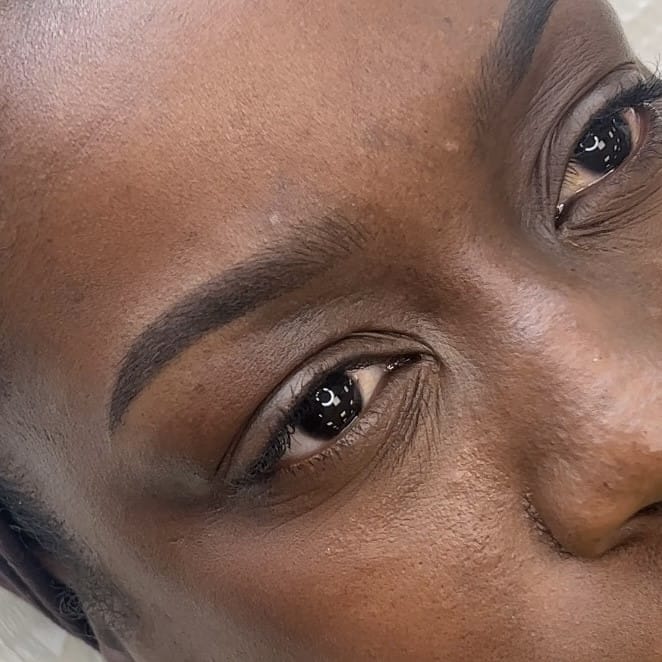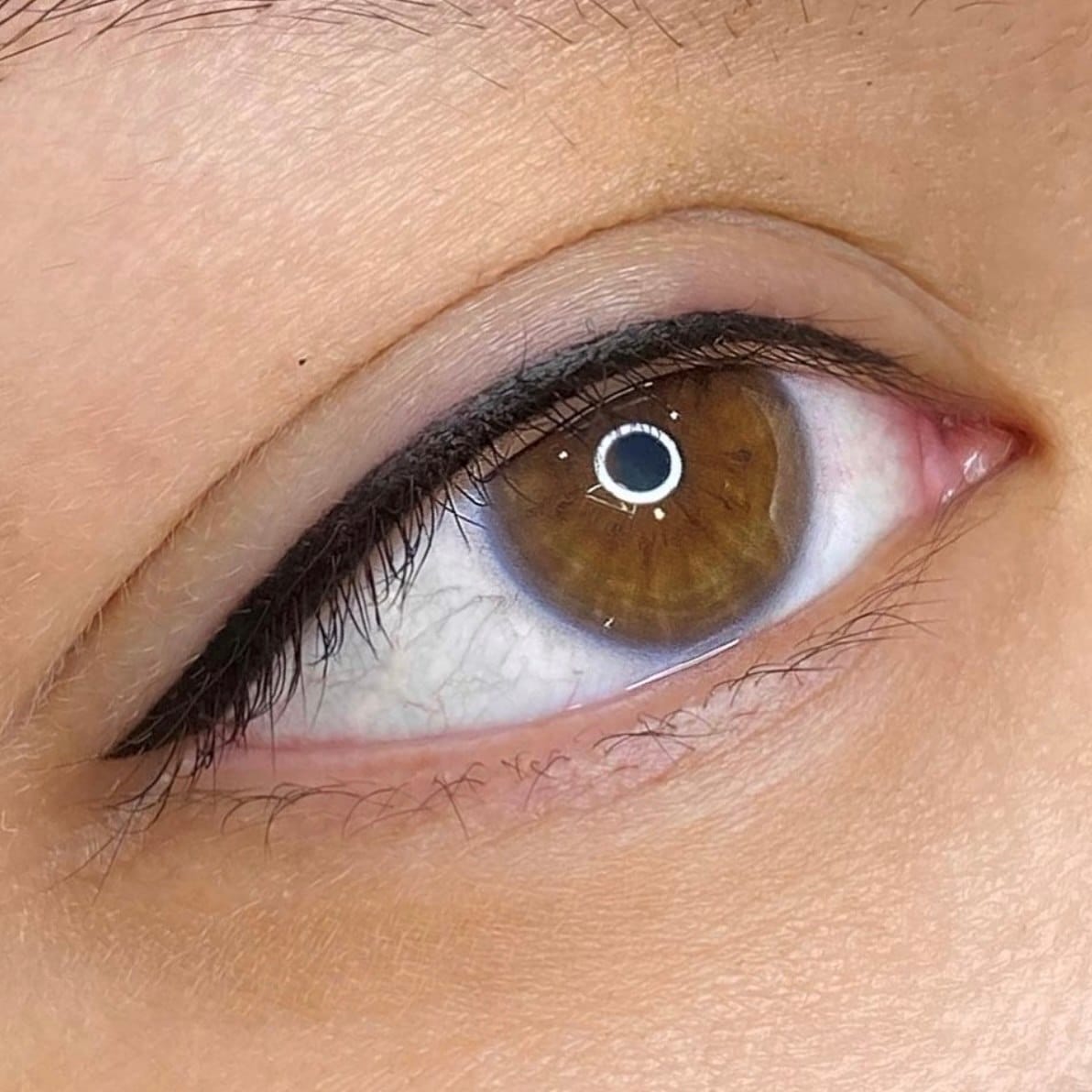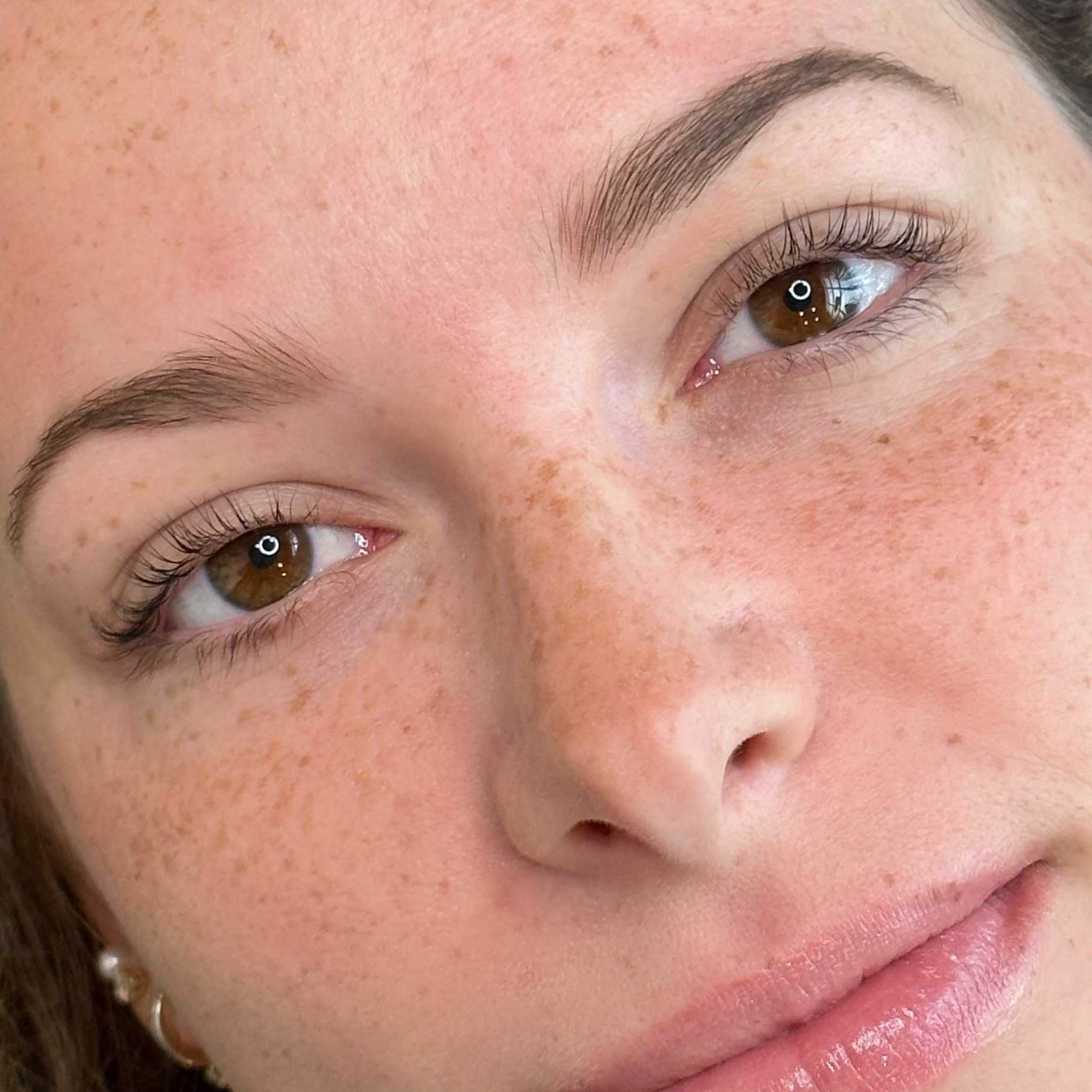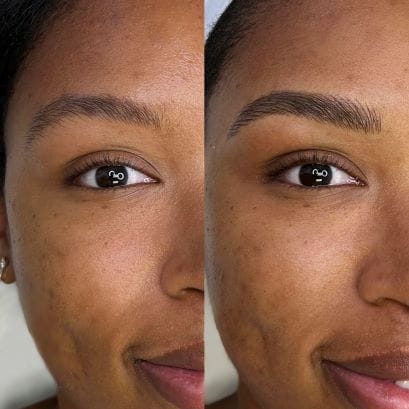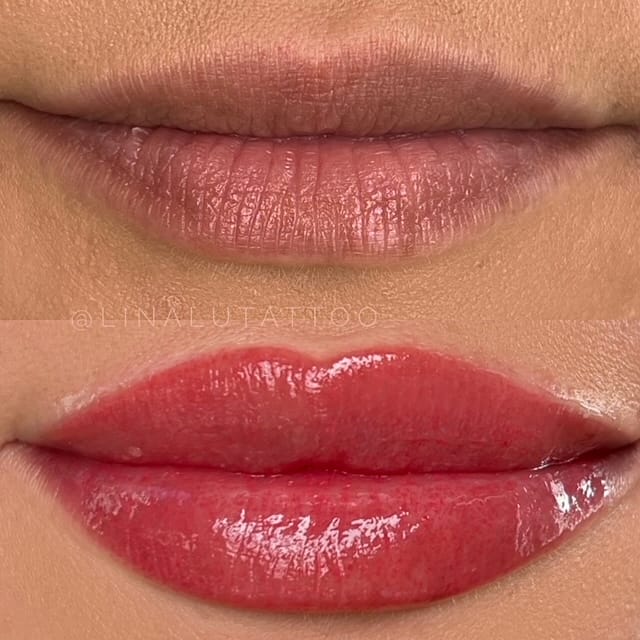- [email protected]
- 725-277-2886
DAELA Cosmetic Tattoo Las Vegas Before & Aftercare
General Pre-Appointment FAQ's
Read below to find answers to the most common questions!
Essential Skin Requirements
Before undergoing any cosmetic tattoo procedure, such as eyebrow, lip, eyeliner, freckle, or beauty mark treatments, it is imperative that your skin satisfies specific requirements.
The designated tattoo area must be free from the following:
- Acne
- Cuts or open wounds
- Infections
- Cold sores
If you are experiencing any of the following conditions, we kindly request that you provide photos or schedule an in-person consultation:
- Severe scarring
- Textured or uneven skin in the brow region
- Scarring from eczema
- Skin thickening
- Previous eyebrow tattoos you wish to conceal.
- Delicate, crepey skin in the designated area or fine lines spread throughout the region.
Consultations with our Scottsdale, Arizona team can be conducted via phone, email, text, or in person. This consultation helps us assess your eligibility for the procedure and determine the most suitable artist for your specific needs.
Q: Should I stop taking blood thinners before undergoing a cosmetic tattoo procedure?
A: It is advisable to consult with your healthcare provider or the professional performing the procedure regarding the discontinuation of blood thinners. They will assess your medical history and the specific procedure to provide personalized recommendations.
Q: Do blood thinners increase the risk of bleeding during a cosmetic tattoo procedure?
A: Certain blood thinners can increase the risk of bleeding during the procedure. To minimize this risk, your healthcare provider may advise temporarily stopping these medications prior to the cosmetic tattoo procedure.
Q: Which blood thinners might require discontinuation before a cosmetic tattoo procedure?
A: Common blood thinners like warfarin, aspirin, and nonsteroidal anti-inflammatory drugs (NSAIDs) may need to be temporarily stopped before the procedure. Direct oral anticoagulants (DOACs) might also require adjustment. However, specific guidance should be obtained from your healthcare provider.
Q: How long before the cosmetic tattoo procedure should I stop taking blood thinners?
A: The timing for discontinuing blood thinners can vary based on the specific medication and individual circumstances. Your healthcare provider will provide you with the appropriate timeframe, usually around 5 to 7 days before the procedure.
Q: Can I make the decision to discontinue blood thinners on my own before the procedure?
A: It is crucial to consult with your healthcare provider before making any decisions regarding the discontinuation of blood thinners. They will consider factors such as your overall health and the type of cosmetic tattoo procedure to provide the safest recommendations for you.
Q: What should I do if I have concerns about blood thinners and my cosmetic tattoo procedure?
A: If you have concerns or questions about blood thinners and their potential impact on your cosmetic tattoo procedure, it is best to consult with your healthcare provider or the professional performing the procedure. They will be able to provide you with personalized advice based on your individual situation.
Caffeine, commonly found in beverages like coffee, tea, energy drinks, and even certain medications, acts as a stimulant. Although caffeine itself doesn’t directly thin the blood, it can influence blood pressure and heart rate. It’s crucial to understand the potential risks associated with high doses of caffeine before undergoing a cosmetic tattoo procedure.
Minimizing Risks: Moderating Caffeine Intake
- To reduce the chances of bleeding complications during your cosmetic tattoo procedure, it’s generally advised to avoid excessive consumption of caffeine. We require that you consume no caffeine the day of your treatment. Keep in mind that individual reactions to caffeine may vary due to personal tolerance and sensitivity.
- No, it is generally not recommended to get cosmetic tattoos if you are pregnant or breastfeeding.
- The safety of cosmetic tattooing during pregnancy and breastfeeding has not been extensively studied, and there is a lack of conclusive evidence regarding its effects on the developing fetus or the transfer of substances through breast milk.
- During pregnancy, your body undergoes hormonal changes that can affect the healing process and the way your skin reacts to tattooing. Additionally, there is a potential risk of infection or adverse reactions to the tattooing process, which could indirectly affect your pregnancy.
- At DAELA Cosmetic Tattoo, it is our policy not to provide services to those who are pregnant or breastfeeding.
Following before and aftercare instructions for cosmetic tattooing is important for several reasons:
Proper Healing: Following the recommended care instructions helps promote proper healing of the tattooed area. Cosmetic tattooing involves the introduction of pigments into the skin, and the healing process plays a crucial role in the final appearance and longevity of the tattoo. By following the care instructions, you can minimize the risk of complications, such as infections or excessive scarring, and ensure optimal healing.
Preservation of Color and Shape: Following the aftercare instructions can help preserve the color and shape of the cosmetic tattoo. Care instructions often include avoiding activities that could cause premature fading or distortion of the pigment, such as excessive exposure to sunlight, swimming, or using certain skincare products. By adhering to these instructions, you can extend the lifespan of your tattoo and maintain its desired appearance.
Minimization of Risks and Complications: Adhering to before and aftercare instructions reduces the risk of potential complications. Following the guidelines helps minimize the chances of infections, allergic reactions, or other adverse effects that could arise from improper care. It also helps prevent issues like scabbing, peeling, or scarring that could negatively impact the final result of the tattoo.
Consistency and Predictability: Following a standardized before and aftercare routine provides consistency and predictability in the healing process. Tattoo artists often provide specific instructions based on their experience and knowledge of how the skin reacts to tattooing. By following these instructions, you align yourself with the best practices recommended by professionals, increasing the likelihood of successful healing and optimal results.
Long-Term Satisfaction: Proper care can contribute to long-term satisfaction with your cosmetic tattoo. By following the recommended instructions, you give your tattoo the best chance to heal well, maintain its color and shape, and age gracefully. This can result in greater satisfaction and enjoyment of your cosmetic tattoo over time.
Overall, following before and aftercare instructions for cosmetic tattoos helps ensure a successful outcome, minimize risks, and promote optimal healing and longevity of the tattoo. It is essential to consult with your tattoo artist and follow their specific instructions, as they can provide tailored advice based on your individual needs and the specific type of cosmetic tattoo you are receiving.
Before & After Care
Choose your service below for full details!
Who is eligible for eyebrow tattooing?
To undergo eyebrow tattooing, you must meet the following criteria:
- You cannot be pregnant or breastfeeding.
- You must be 18 years of age or older.
If you have previous eyebrow tattoos, a consultation is required.
If you have heavy scarring, textured or bumpy skin, or very thin skin, a consultation is required.
Variable Timeframe:
- ANTIBIOTICS: The general rule for antibiotics is: You should have finished your antibiotic course for as long as you were on the course before having any tattoo procedure. For example: If you are on a 14-day antibiotic cycle then your appointment should follow no sooner than 14-days after you have completed your antibiotics. If you have a booked appointment and it becomes necessary to take antibiotics, please call us and reschedule using this time frame guideline!
6 Weeks Prior:
- Avoid using retinol products, acne treatments, or salicylic acid on the brow area.
- No oral steroid use.
- No brow growth serums.
1 Week Prior:
- No injections of Botox type treatments or fillers around the site of your upcoming permanent makeup treatment. If it’s time for these injections, schedule them for just after the permanent makeup appointment.
- Discuss with your doctor the possibility of discontinuing blood thinners that have been prescribed by your doctor. After the treatment you can immediately begin taking them again. Please let us know what your doctor has suggested.
- Refrain from using any over-the-counter blood thinners like aspirin.
- Avoid sauna sessions and tanning.
- Discontinue the use of fish oil and Vitamin E.
72 hours prior:
- Special Note: The use of cannabis can heighten pain sensitivity significantly. It is always our goal to reduce pain and discomfort as much as we possibly can, so we suggest that cannabis products are not consumed within 72 hours of your appointment.
48 hours prior:
- Discontinue vitamins until after the treatment.
- Drink plenty of water with electrolytes.
24 Hours Prior:
- Avoid consuming alcohol, excessive caffeine, and painkillers.
On the Day of:
- Please do not consume caffeine products.
- Arrive with a makeup-free face.
Cleansing and Aftercare:
- On the first day, let your brows relax and do not wet, apply moisturizer, or touch them.
- From days 2 to 7, gently wash your eyebrows twice daily with water and an antibacterial soap like Cetaphil or Neutrogena. Use your fingertips to cleanse the area gently.
- After washing, moisturize by applying a small amount of aftercare ointment with a cotton swab. Avoid over-applying.
- Limit showers to 5-8 minutes, keeping your face/treated area out of the water as much as possible. Avoid excessive rinsing and hot water on the brows.
- Things to Avoid During Healing:
- Do not wear makeup in the brows for 10 days.
- Avoid scratching or picking the brows.
- Limit showers to 5-8 minutes and avoid excessive water exposure to the brows.
- Do not use acid or manual exfoliants on the brows.
- Avoid sweating in the brow area for 10 days.
- Stay away from swimming, saunas, UV exposure, tanning beds, acne products, hydroxy acids, laser light therapy, facials, threading, waxing, or removal products.
After Healing:
- Brow tattoos can last between 1 to 3 years, depending on lifestyle, skin type, and aftercare.
- Apply sunscreen with an SPF of 50 or greater to the brow area once completely healed.
- Avoid using chemical exfoliants on the brows.
- Do not undergo laser treatments near the brow area, as some lasers may alter the ink color.
- Additional brow makeup application will be completely up to you!
To undergo lip tattooing, you must meet the following criteria:
- You cannot be pregnant or breastfeeding.
- You must be 18 years of age or older.
Variable Timeframe:
ANTIBIOTICS: The general rule for antibiotics is: You should have finished your antibiotic course for as long as you were on the course before having any tattoo procedure. For example: If you are on a 14-day antibiotic cycle then your appointment should follow no sooner than 14-days after you have completed your antibiotics. If you have a booked appointment and it becomes necessary to take antibiotics, please call us and reschedule using this time frame guideline!
COLD SORES: If you have a history of cold sores, ask your doctor for a prescription for Acyclovir. Start taking it three days before your appointment and continue for three days after the procedure.
3 Weeks Prior:
- Avoid deep exfoliation treatments, like chemical peels.
1 Week Prior:
- No injections of Botox type treatments or fillers around the site of your upcoming lip treatment area. If it’s time for these injections, schedule them for after the lip tattoo appointment.
- Discuss with your doctor the possibility of discontinuing blood thinners that have been prescribed by your doctor. After the treatment you can immediately begin taking them again. Please let us know what your doctor has suggested. Refer to our blood thinner FAQ for more details.
- Refrain from using any over-the-counter blood thinners like aspirin.
- Avoid sauna sessions and tanning.
- Discontinue the use of fish oil and Vitamin E.
72 hours prior:
Special Note: The use of cannabis can heighten pain sensitivity significantly. It is always our goal to reduce pain and discomfort as much as we possibly can, so we suggest that cannabis products are not consumed within 72 hours of your appointment.
48 hours prior:
- Discontinue vitamins until after the treatment.
- Drink plenty of water with electrolytes.
24 Hours Prior:
- Avoid consuming alcohol, excessive caffeine, and painkillers.
On the Day of:
- Please do not consume caffeine products.
Cleansing & Care
- Clean your hands before touching your lips.
- Wash your lips before bed with lukewarm water and unscented soap or cleanser.
- Apply the aftercare balm provided by Daela Cosmetic Tattoo in a thin layer after cleaning.
- Repeat this process in the morning and evening for five days.
- Avoid over-saturating the lips with the healing balm and do not let them become too dried out.
Things to Avoid:
- Avoid consuming super spicy foods within the first 24 hours.
- Do not apply any lip makeup for one week, except for the healing balm provided.
- Avoid scratching, picking, or licking dry skin or flakiness.
- Keep foreign body fluids away from the lips for five days.
- Refrain from activities that cause extreme sweating for five days.
- Avoid swimming pools, hot tubs, or bodies of water for five days.
- Stay away from UV exposure, including tanning booths, for five days.
- Do not undergo massages, facials, or other skin treatments for five days.
- Avoid laser light therapy, as it can affect the pigment color of the lips.
- Do not use exfoliants, retinol acids, glycolic acids, or alpha hydroxy acids on the lips for 30 days after the appointment, as it may cause premature fading.
After Healing:
- Lip tattoos can last between 2 to 3 years, depending on lifestyle, skin type, and aftercare.
- Apply sunscreen with an SPF of 20 or greater on the lip area once completely healed.
- Avoid using chemical exfoliants on the lips, as it may cause fading.
Who is eligible for eyeliner tattooing?
- To undergo eyeliner tattooing, you must meet the following criteria:
- You cannot be pregnant or breastfeeding.
- You must be 18 years of age or older.
Variable Timeframe:
- ANTIBIOTICS: The general rule for antibiotics is: You should have finished your antibiotic course for as long as you were on the course before having any tattoo procedure. For example: If you are on a 14-day antibiotic cycle then your appointment should follow no sooner than 14-days after you have completed your antibiotics. If you have a booked appointment and it becomes necessary to take antibiotics, please call us and reschedule using this time frame guideline!
1 Month Prior:
- Avoid using retinols, acids, anti-aging products, or acne products on the upper lid.
- Refrain from using lash enhancement serums for one month prior to your appointment.
1 Week Prior:
- Avoid sauna sessions and tanning.
- Discontinue the use of fish oil and Vitamin E.
- Refer to our FAQ about blood thinners. It is recommended to stop taking blood thinners according to the suggested guidelines. If you are on prescribed blood thinners, consult your doctor and inform us of their advice.
2 Days Before:
- You must have lash extensions removed two days before your appointment.
- Avoid consuming caffeine or alcohol within 24 hours prior to your appointment.
1 Day Before and Day of:
- Do not wear contact lenses during the appointment.
- Do not wear eye makeup to the appointment.
- Ensure you do not have a stye or any other eye infection or irritation.
How you will feel.
- Your eyelids may be slightly swollen for 24-72 hours, which is normal.
- To relieve swelling, you can apply a soft gel ice pack and take ibuprofen or Benadryl as needed.
- Do not pick or peel any scabs.
- Swelling and redness will decrease within 24-48 hours.
Cleansing:
- On the first night, splash your eyes with water to wash off any pigment residue. Pat dry gently with a clean tissue or towel.
- Wash the skin around the eyes twice a day (morning and night) using a gentle, unscented soap. Use your fingertips to cleanse gently and pat dry with a clean tissue.
- Apply the given aftercare product 2-3 times a day for up to 14 days for eyeliner (omit for lash line enhancement). Avoid petroleum-based products.
- Avoid using chemical exfoliants or heavy creams on the eyes, as they may cause fading.
- The color may fade approximately 30-50% lighter when the scabs fall off, which is normal. Additional color can be added during the touch-up session.
Things to Avoid:
- Avoid activities that cause sweating for three days.
- For two weeks, avoid applying any makeup to the eye area.
- Do not scratch or remove scabs, dry skin, or flakiness, as it can result in color loss.
- Avoid using Vaseline, Neosporin, and other petroleum-based products.
- Refrain from swimming in pools, hot tubs, or bodies of water.
- Stay away from UV exposure, including tanning booths.
- Avoid laser light therapy
Who is eligible for freckles and beauty marks tattooing?
- To undergo freckles and beauty marks tattooing, you must meet the following criteria:
- You cannot be pregnant or breastfeeding.
- You must be 18 years of age or older.
- To undergo freckles and beauty marks tattooing, you must meet the following criteria:
Variable Timeframe:
ANTIBIOTICS: The general rule for antibiotics is: You should have finished your antibiotic course for as long as you were on the course before having any tattoo procedure. For example: If you are on a 14-day antibiotic cycle then your appointment should follow no sooner than 14-days after you have completed your antibiotics. If you have a booked appointment and it becomes necessary to take antibiotics, please call us and reschedule using this time frame guideline!
2-4 Weeks Prior:
- Avoid using retinol products, acne treatments, or salicylic acid on the area to be treated for four weeks prior to your appointment.
- Refrain from deep exfoliation, such as chemical peels, in the area to be treated for two weeks prior to your appointment.
- Avoid filler or injections in the area to be treated for three weeks prior to your appointment.
1 Week Prior:
- Avoid sauna sessions or tanning.
- Discontinue the use of fish oil and Vitamin E.
- Refer to our FAQ about blood thinners. It is recommended to stop taking blood thinners according to the suggested guidelines. If you are on prescribed blood thinners, consult your doctor and inform us of their advice.
24 Hours Prior:
- Avoid consuming alcohol.
Day of Your Appointment:
- Avoid consuming caffeine.
- Ensure there are no acne spots, cuts, or open wounds in the area to be treated.
- Do not work out on the day of your appointment.
- Arrive with a makeup-free face.
Cleansing & Care
- For the first 24 hours (Day 1), let the skin relax and do not wash or bathe the treated area.
- From Days 2 to 7, wash the area daily to remove bacteria, product buildup, oils, and dead skin. This does not remove the pigment.
- Gently wash your face each morning and night with water and an antibacterial soap like Cetaphil or Neutrogena. Use a light touch and fingertips to cleanse. Rub the area in a smooth motion for 10 seconds and rinse with water, ensuring all soap is rinsed away. Pat dry with a clean cotton pad. Avoid cleansing products containing acids or exfoliants.
- From Days 1 to 7, apply a small amount of aftercare ointment with a cotton swab, spreading it across the treated area. Avoid over-applying, as it can suffocate the skin and delay healing. The ointment should be barely noticeable. Do not apply the ointment on wet or damp tattoos.
- Limit showers to 5-8 minutes to avoid creating excessive steam. Keep your face or treated area out of the water while washing your body. At the end of your shower, wash your hair. Avoid excessive rinsing and hot water on the treated area. Try to avoid soap or water running over your brows, except during the initial cleanse.
Things to Avoid:
- Avoid wearing makeup on your face for 10 days.
- Do not scratch or pick at the treated area.
- Limit showers to 5-8 minutes and avoid long, hot showers for 10 days.
- Avoid using acid or manual exfoliants on the treated area.
- Do not use any topicals other than the provided healing cream.
- Avoid sweating, swimming, or using a sauna for 10 days.
- Avoid UV exposure or tanning.
- Refrain from using acne products or hydroxy acids.
- Do not undergo laser light therapy.
- Avoid facials for 30 days.
- Do not thread, wax, or use removal products on the treated area.
After You’ve Healed:
- Faux freckle tattoos normally last around 6 months, depending on lifestyle, skin type, and aftercare.
- Apply sunscreen with a sun protection factor (SPF) of 50 or greater once completely healed to protect against fading and discoloration caused by sun exposure or tanning beds.
- Avoid using chemical exfoliants, as they may cause fading.
- Refrain from doing laser treatments near your face, as some lasers may change the color of the ink.
- Additional makeup application may be required post-tattoo to achieve your desired look.
Who is eligible for 3D Areola Restoration?
- To undergo 3D Areola Restoration, you must meet the following criteria:
- You cannot be pregnant or breastfeeding.
- You must be 18 years of age or older.
- To undergo 3D Areola Restoration, you must meet the following criteria:
Variable Timeframes:
- You must be at least 12 weeks post-op with healed wounds before scheduling your appointment.
ANTIBIOTICS: The general rule for antibiotics is: You should have finished your antibiotic course for as long as you were on the course before having any tattoo procedure. For example: If you are on a 14-day antibiotic cycle then your appointment should follow no sooner than 14-days after you have completed your antibiotics. If you have a booked appointment and it becomes necessary to take antibiotics, please call us and reschedule using this time frame guideline!
1 Week Prior:
- Avoid sauna or tanning sessions.
- Refer to our FAQ about blood thinners. It is recommended to stop taking blood thinners according to the suggested guidelines. If you are on prescribed blood thinners, consult your doctor and inform us of their advice.
24 Hours Prior:
- Avoid working out, consuming caffeine, and alcohol.
Cleansing & Care
- Once you get home, remove the bandages.
- Limit wearing a tight bra for the first 48 hours to allow the area to breathe.
- Before touching or washing your tattoos, clean your hands thoroughly.
- Wash your areolas before bed with lukewarm water and unscented soap or cleanser.
- Apply the provided aftercare product in a thin layer after cleaning.
- Repeat the cleaning and aftercare process in the morning for 5 days.
- Avoid over-saturating with aftercare balm or lotion, but don’t let the area become too dried out either.
- After 5 days, switch to using unscented lotion for the next 2 weeks, such as Lubriderm or Cetaphil.
What to Avoid During Healing:
- Do not apply scented lotions or tanning lotions for 2 weeks.
- Avoid scratching, picking, or peeling any dry skin or flakiness.
- Keep foreign body fluids away from the tattoo for 5 days.
- Avoid activities that cause extreme sweating for 5 days.
- Stay away from swimming pools, hot tubs, or other bodies of water for 5 days.
- Avoid UV exposure, including tanning booths, for 5 days.
- Do not undergo laser light therapy near the tattooed area, as it may affect the pigment.
- Refrain from using exfoliants, retinol acids, glycolic acids, and alpha hydroxy acids on the area for 30 days after the appointment, as they can cause premature fading.
After Healing:
- Areola tattoos can last for many years, but the longevity depends on factors such as lifestyle, skin type, and aftercare.
- Apply sunscreen with an SPF of 50 or greater on the area if exposed to the sun or tanning beds.
- Avoid using chemical exfoliants on the areolas, as they can cause fading.
- Avoid laser treatments near the areola tattoo area, as some lasers may alter the ink color.
- Additional touch-ups may be required after a few years to maintain a fresh, bold, and beautiful look.
Who is eligible for scar camouflage tattooing?
- To undergo scar camouflage tattooing, you must meet the following criteria:
- You cannot be pregnant or breastfeeding.
- You must be 18 years of age or older.
- To undergo scar camouflage tattooing, you must meet the following criteria:
Variable Timeframes:
- You must be at least 12 weeks post-op with fully healed wounds before scheduling the scar camouflage tattoo appointment.
ANTIBIOTICS: The general rule for antibiotics is: You should have finished your antibiotic course for as long as you were on the course before having any tattoo procedure. For example: If you are on a 14-day antibiotic cycle then your appointment should follow no sooner than 14-days after you have completed your antibiotics. If you have a booked appointment and it becomes necessary to take antibiotics, please call us and reschedule using this time frame guideline!
One Week Prior:
- Avoid sauna sessions and tanning.
- Refer to our FAQ about blood thinners. It is recommended to stop taking blood thinners according to the suggested guidelines. If you are on prescribed blood thinners, consult your doctor and inform us of their advice.
1 Day Prior and Day of :
- Avoid working out on the day of your appointment.
- Refrain from consuming alcohol.
- Refrain from consuming caffeine.
Cleansing & Care
- Limit the wear of tight clothing for the first 48 hours to allow the area to breathe.
- Once you get home, remove the bandages.
- Clean your hands before touching the tattoos and washing them.
- Wash your new tattoos before bed with lukewarm water and unscented soap or cleanser.
- Apply the given aftercare product in a thin layer after cleaning.
- Repeat this process in the morning and continue for a minimum of 5 days.
- Avoid over-saturating the tattoos with aftercare balm and lotions, and don’t let the area get too dried out.
- After 5 days, use unscented lotion for 2 weeks, such as Lubriderm or Cetaphil.
Things to Avoid:
- Avoid applying scented lotions or tanning lotions for the first 2 weeks.
- Do not scratch, pick, or peel any dry skin or flakiness.
- Keep foreign body fluids away from or around the tattoo for 5 days.
- Avoid activities that cause extreme sweating for 5 days.
- Refrain from swimming in pools, hot tubs, or bodies of water for 5 days.
- Stay away from UV exposure, including tanning booths, for 5 days.
- Do not undergo laser light therapy, as it can affect the color of the tattoo.
- Avoid using exfoliants, retinol acids, glycolic acids, and alpha hydroxy acids on the area for 30 days after the appointment, as they can cause premature fading.
- Refrain from receiving massages, facials, or other skin treatments for 5 days.
After You’ve Healed:
- Exposure to the sun and tanning beds can cause fading and discoloration of the pigment. Once completely healed, always apply sunscreen (50 SPF or greater) if the area is exposed.
- Avoid using chemical exfoliants on the areola, as it may cause fading.
- Do not undergo laser treatments near the areola tattoo area, as some lasers can change the color of the ink.
